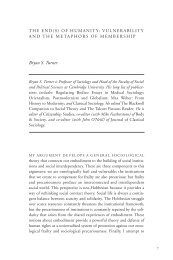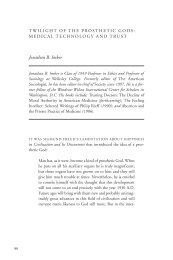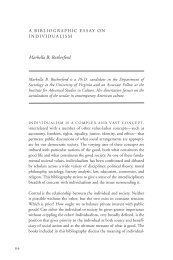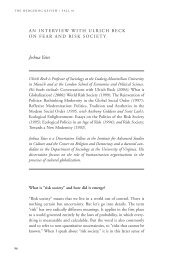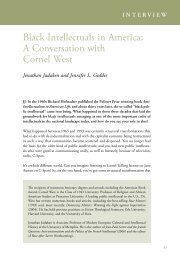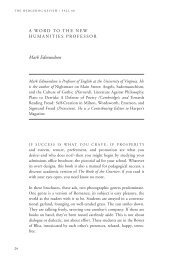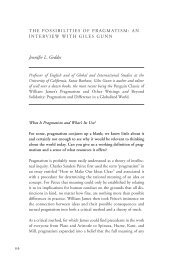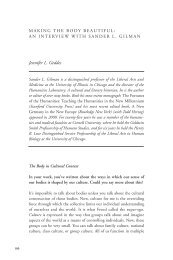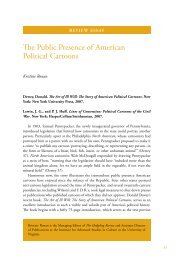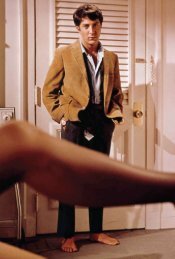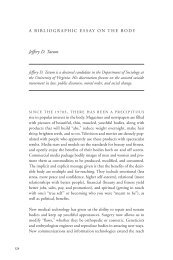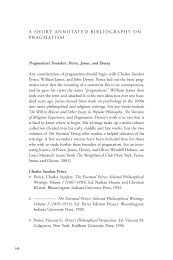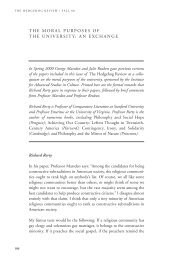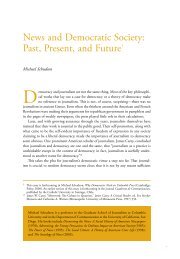A Mirror or a Lamp? - Institute for Advanced Studies in Culture
A Mirror or a Lamp? - Institute for Advanced Studies in Culture
A Mirror or a Lamp? - Institute for Advanced Studies in Culture
Create successful ePaper yourself
Turn your PDF publications into a flip-book with our unique Google optimized e-Paper software.
A <strong>Mirr<strong>or</strong></strong> <strong>or</strong> a <strong>Lamp</strong>?<br />
Adam Zagajewski<br />
Nous sommes dans un temps où les hommes, poussés par de médiocres et féroces idéologies,<br />
s’habituent à avoir honte de tout. Honte d’eux-mêmes, honte d’être heureux, d’aimer<br />
ou de créer. Un temps où Rac<strong>in</strong>e rougirait de Bérenice et où Rembrandt, pour se faire pardonner<br />
d’avoir pe<strong>in</strong>t la Ronde de nuit, courrait s’<strong>in</strong>scrire à la permanence du co<strong>in</strong>.<br />
—Albert Camus 1<br />
[We live <strong>in</strong> an age when men, pushed by mediocre and ferocious ideologies, have become<br />
used to be<strong>in</strong>g ashamed of everyth<strong>in</strong>g. Ashamed of themselves, ashamed of be<strong>in</strong>g happy, of<br />
lov<strong>in</strong>g <strong>or</strong> of creat<strong>in</strong>g. A time when Rac<strong>in</strong>e would blush because of Bérenice and when<br />
Rembrandt, <strong>in</strong> <strong>or</strong>der to be f<strong>or</strong>given f<strong>or</strong> hav<strong>in</strong>g pa<strong>in</strong>ted “The Night Watch,” would run to<br />
the nearest doct<strong>or</strong>’s office.]<br />
There was once a young, red-haired poet <strong>in</strong> Len<strong>in</strong>grad, who began to write <strong>in</strong><br />
the late fifties, and by the mid-sixties was widely known <strong>in</strong> the West. B<strong>or</strong>n <strong>in</strong><br />
1940, Joseph Brodsky survived the siege of his native city dur<strong>in</strong>g W<strong>or</strong>ld War II,<br />
when he was an <strong>in</strong>fant. His parents survived the cruelest years of the Stal<strong>in</strong>ist era. When<br />
he reached the age of <strong>in</strong>tellectual maturity, someth<strong>in</strong>g had changed <strong>in</strong> the totalitarian<br />
1 Albert Camus, “The Artist as a Witness of Freedom,” 1947 speech, my translation. A different translation is<br />
available at .<br />
A lead<strong>in</strong>g poet of the Polish New Wave, Adam Zagajewski is Visit<strong>in</strong>g Associate Profess<strong>or</strong> of<br />
English <strong>in</strong> the Creative Writ<strong>in</strong>g Program at the University of Houston. Several of his books<br />
have been translated <strong>in</strong>to English <strong>in</strong>clud<strong>in</strong>g: several volumes of poetry: Mysticism f<strong>or</strong><br />
Beg<strong>in</strong>ners (1997), Trem<strong>or</strong> (1985), and Canvas (1991); a memoir, Another Beauty (2000);<br />
and two prose collections, Two Cities (1995) and Solitude and Solidarity (1990). He has<br />
received a fellowship from the Berl<strong>in</strong>er Kunstlerprogramm, the Kurt Tucholsky Prize, a<br />
Prix de la Liberté, and a Guggenheim Fellowship.<br />
15
THE HEDGEHOG REVIEW / SUMMER 04<br />
mach<strong>in</strong>e of the Soviet state, and a temp<strong>or</strong>ary relaxation of Stal<strong>in</strong>ist m<strong>or</strong>es occurred. It<br />
was now possible to f<strong>in</strong>d some time-w<strong>or</strong>n booklets of Mandelstam and Tsvetaeva <strong>in</strong> the<br />
back rooms of second-hand bookst<strong>or</strong>es. One was no longer sent to lab<strong>or</strong> camps on the<br />
evidence of keep<strong>in</strong>g these books at home.<br />
Hist<strong>or</strong>ians of culture should study this case: an entire current of Russian poetry, the<br />
Acmeist school, which claimed the right to artistic freedom and to the joy of embrac<strong>in</strong>g<br />
the entire Western tradition of art, had been destroyed physically and politically <strong>in</strong> the<br />
thirties, and its shadow was now poised as if wait<strong>in</strong>g to see whether some young, redhaired<br />
poet would deign to revive it lov<strong>in</strong>gly—<strong>or</strong>, if not, whether it would rema<strong>in</strong> silent<br />
f<strong>or</strong>ever, buried <strong>in</strong> the secret archives of the secret police. Yes, Anna Akhmatova was alive<br />
and writ<strong>in</strong>g, but it is one th<strong>in</strong>g to have one rema<strong>in</strong><strong>in</strong>g auth<strong>or</strong> still active and quite<br />
another to see the hearts and m<strong>in</strong>ds of younger writers warm up and open to the<br />
f<strong>or</strong>bidden past.<br />
Brodsky was not alone <strong>in</strong> his quest f<strong>or</strong> the “shadows of f<strong>or</strong>gotten ancest<strong>or</strong>s” (to quote the<br />
title of a film by Paradzhanov). An entire group of young poets, with Yevgeny Re<strong>in</strong> and<br />
Alexander Kushner among others, decided to learn their craft and their metaphysic not<br />
from the mediocre poets promoted by the Marxist state, who praised the grayness of the<br />
Soviet reality, but from the Acmeists, whose books had been out of pr<strong>in</strong>t f<strong>or</strong> decades.<br />
Anna Akhmatova, who knew the young poets well and liked them, called them “a magical<br />
ch<strong>or</strong>us.” This is an example of how poetry travels from one generation to another,<br />
over the gap of time and mass graves, on the w<strong>in</strong>gs of a dis<strong>in</strong>terested <strong>in</strong>tellectual passion.<br />
At the same time, <strong>in</strong> the fifties and sixties, you could hear <strong>in</strong> Western Europe many a the<strong>or</strong>ist<br />
assert<strong>in</strong>g that poetry was dead. It is not easy to say whether this was a simple echo<br />
of Ad<strong>or</strong>no’s famous warn<strong>in</strong>g concern<strong>in</strong>g the very possibility of poetry after Auschwitz, <strong>or</strong><br />
whether the <strong>in</strong>defatigable activity of the structuralist movement had already started to<br />
thwart the voice of poetry (as it almost successfully did <strong>in</strong> France later on).<br />
It seems to me that the reasons f<strong>or</strong> this mournful claim deny<strong>in</strong>g poetry’s right to existence<br />
must have been quite deep, and maybe a noticeable geographical c<strong>or</strong>relation with<br />
the territ<strong>or</strong>ies once occupied by the Wehrmacht, Germany’s armed f<strong>or</strong>ces dur<strong>in</strong>g the<br />
W<strong>or</strong>ld War II, was not quite accidental. I well remember from the first years of my own<br />
poetic apprenticeship that British auth<strong>or</strong>s, f<strong>or</strong> example, did not jo<strong>in</strong> <strong>in</strong> the trash<strong>in</strong>g of<br />
the lyric so typical then f<strong>or</strong> cont<strong>in</strong>ental writers.<br />
The example of Joseph Brodsky is tell<strong>in</strong>g: poetry is a Phoenix that can be reb<strong>or</strong>n out of<br />
ashes. With all due respect f<strong>or</strong> the th<strong>in</strong>kers and ideologues (well, to tell the truth, m<strong>or</strong>e<br />
of this respect goes to the f<strong>or</strong>mer than the latter), Brodsky’s case teaches us that poetry,<br />
although always l<strong>in</strong>ked to philosophy, also has a second life and a second l<strong>in</strong>eup of heritage:<br />
the life of the art of poetry as embodied and preserved <strong>in</strong> the immediate <strong>or</strong> not<br />
quite so immediate past.<br />
16
A MIRROR OR A LAMP? / ZAGAJEWSKI<br />
Isn’t this a model of survival f<strong>or</strong> all the arts, at least s<strong>in</strong>ce Hegel’s severe judgment pronounc<strong>in</strong>g<br />
the <strong>in</strong>evitable decl<strong>in</strong>e of the Western imag<strong>in</strong>ation? Pa<strong>in</strong>ters f<strong>in</strong>d solace—and<br />
learn<strong>in</strong>g—<strong>in</strong> other pa<strong>in</strong>ters’ w<strong>or</strong>k, musicians read and admire old sc<strong>or</strong>es, poets study<br />
Homer and Baudelaire rather than Hegel and his numerous progeny. Art needs philosophy<br />
and shuns it as well.<br />
Some other poets who were active dur<strong>in</strong>g Brodsky’s lifetime (he died <strong>in</strong> January 1996) are<br />
w<strong>or</strong>th mention<strong>in</strong>g here. Czeslaw Milosz spent the fifties <strong>in</strong> Paris and was exposed to the<br />
venoms of an ideological culture obsessed with the notion of radical social rebellion. The<br />
extent of this obsession can be traced even <strong>in</strong> such a noble<br />
book as Albert Camus’ The Rebel, where the auth<strong>or</strong> needs 300 Art needs philosophy and<br />
pages to conv<strong>in</strong>ce the reader that the rebellion shouldn’t be<br />
confounded with revolution. The latter, says Camus rightly, shuns it as well.<br />
always creates its own terr<strong>or</strong>, its own bureaucracy and stagnation—and<br />
thus recreates the monster aga<strong>in</strong>st which it turned <strong>in</strong> the first place. The Parisian<br />
context wasn’t propitious f<strong>or</strong> poetry. Indeed, we know from Milosz’s autobiographical<br />
writ<strong>in</strong>g that the Parisian decade was m<strong>or</strong>e like a desert than an oasis f<strong>or</strong> his poetic creation.<br />
Zbigniew Herbert, another maj<strong>or</strong> Polish poet, half a generation older than Brodsky,<br />
thrived <strong>in</strong> the atmosphere of the Sovietized Central Europe—thrived through polemic<br />
rather than participation. Many of his poems read as variations on the theme of the place<br />
of poetry with<strong>in</strong> a totalitarian environment.<br />
F<strong>or</strong> example, his poem “The Power of Taste” 2 can be read <strong>in</strong> different ways: as a proclamation<br />
of an aesthete <strong>or</strong> of a stoical philosopher, as an ironic belittlement of the agents<br />
of the Zeitgeist, <strong>or</strong> as a poem written <strong>in</strong> h<strong>in</strong>dsight (<strong>in</strong>deed “The Power of Taste” has the<br />
flav<strong>or</strong> of a hist<strong>or</strong>ical rem<strong>in</strong>iscence; written <strong>in</strong> the late 1970s <strong>or</strong> early 1980s, <strong>in</strong> the years<br />
of a slow decomposition of the Soviet empire, it breathes a self-confidence which probably<br />
was not so obvious <strong>in</strong> the time of trial, when Stal<strong>in</strong> was still alive and well).<br />
“The Power of Taste” is dedicated to Profess<strong>or</strong> Izyd<strong>or</strong>a Dambska, a philosopher of<br />
neopositivist <strong>or</strong>ientation, a woman of admirable courage, and one of the rather few<br />
<strong>in</strong>c<strong>or</strong>ruptible Polish scholars. The dedication complicates the task of the reader a little:<br />
this poem praises art but is an <strong>in</strong>tellectual present f<strong>or</strong> a scholar, not an artist.<br />
Nonetheless it is a praise of art. We hear about taste but we should, I th<strong>in</strong>k, put the w<strong>or</strong>d<br />
“art” <strong>in</strong> its place. Herbert’s poem can be understood either as a nonchalant dismissal of<br />
the Communist totalitarian state, <strong>or</strong>, m<strong>or</strong>e <strong>in</strong>terest<strong>in</strong>gly, as a m<strong>in</strong>i-treatise on the power<br />
of art, on art as a spiritual arm<strong>or</strong>. In other w<strong>or</strong>ds, this poem is either tell<strong>in</strong>g us about the<br />
2 Zbigniew Herbert, “The Power of Taste,” Rep<strong>or</strong>t from the Besieged City, trans. John Carpenter and Bogdana<br />
Carpenter (New Y<strong>or</strong>k: Ecco, 1985) 69–70.<br />
17
THE HEDGEHOG REVIEW / SUMMER 04<br />
whim of an aesthete who frivolously decided to pooh-pooh the call of a “progressive”<br />
political movement <strong>or</strong> about the <strong>in</strong>commensurable f<strong>or</strong>ce of art fac<strong>in</strong>g dictat<strong>or</strong>ship. Of<br />
course it is the latter. It is a hymn to m<strong>or</strong>al wisdom hidden <strong>in</strong> art; beauty, addressed by<br />
the speaker of the poem, is not the superficial beauty of “Marie Claire” but beauty of the<br />
most serious and complex k<strong>in</strong>d. “So aesthetics can be helpful <strong>in</strong> life/one should not neglect<br />
the study of beauty,” says Herbert. And if so, then the dedication to the philosopher<br />
could be seen as an ambivalent gesture, as a tribute to her adamant stand but also as an<br />
almost ironic h<strong>in</strong>t that amounts to say<strong>in</strong>g, “I admire your m<strong>or</strong>al f<strong>or</strong>ce, but my f<strong>or</strong>ce<br />
spr<strong>in</strong>gs from art, not philosophy.”<br />
If my read<strong>in</strong>g of “The Power of Taste” is c<strong>or</strong>rect, Herbert’s stance doesn’t differ that<br />
much from Brodsky’s; both poets knew <strong>or</strong> felt that <strong>in</strong> difficult times a trustful turn<strong>in</strong>g to<br />
art, to poetry, can be much m<strong>or</strong>e fruitful than rely<strong>in</strong>g on the<strong>or</strong>y alone.<br />
There were other differences between them, though: Herbert (as well as Milosz) didn’t<br />
share Brodsky’s rejection of a direct dialogue between poetry and social reality, of any<br />
direct critique of the totalitarian situation. Brodsky’s attitude was highly aristocratic: a<br />
free imag<strong>in</strong>ation embodied <strong>in</strong> perfectly crafted poems was supposed to put to shame the<br />
gray, prison-like w<strong>or</strong>ld of totalitarian Marxism just like that, automatically, by the sheer<br />
display of <strong>in</strong>ner greatness. Not so f<strong>or</strong> Milosz and Herbert—<strong>or</strong> Wislawa Szymb<strong>or</strong>ska, f<strong>or</strong><br />
that matter; they regarded poetry as the voice of an <strong>in</strong>dividual liv<strong>in</strong>g with<strong>in</strong> society and<br />
exchang<strong>in</strong>g gifts of poetry and reason, of rapture and critique, with this society. Even<br />
Milosz’s long-term exile didn’t bar him from this trade; his poems and essays voyaged to<br />
Poland, smuggled by all k<strong>in</strong>ds of travelers.<br />
The difference between Brodsky and the others is cultural and can be expla<strong>in</strong>ed both by<br />
the dist<strong>in</strong>ct poetic traditions <strong>in</strong> Russia and Poland and by disparate political contexts: <strong>in</strong><br />
the Soviet Union the n<strong>or</strong>mative aesthetic of socialist realism was still upheld <strong>in</strong> the sixties<br />
whereas Poland enjoyed a rather relative freedom of artistic expression. In Poland only<br />
the political content of literary w<strong>or</strong>ks was cens<strong>or</strong>ed, not their f<strong>or</strong>mal aspect; the sheer f<strong>or</strong>mal<br />
freedom <strong>in</strong> Polish poetry was not seen by the government as politically defiant.<br />
Hist<strong>or</strong>ically, the model of poetic tradition transmission that I have just outl<strong>in</strong>ed—the<br />
two rails of this transmission be<strong>in</strong>g the<strong>or</strong>etical th<strong>in</strong>k<strong>in</strong>g and/<strong>or</strong> the pure energy of poetry<br />
itself—has changed significantly s<strong>in</strong>ce Western literature crossed the gates of<br />
Modernity. Of course, philosophy had always <strong>in</strong>fluenced poets. Renaissance poets studied<br />
Marsilio Fic<strong>in</strong>o with probably the same zeal with which many twentieth-century<br />
poets read Bergson (not to mention later th<strong>in</strong>kers). And much earlier poets did not shun<br />
from read<strong>in</strong>g Plot<strong>in</strong>us (<strong>or</strong> Plato). Yet—I am not an hist<strong>or</strong>ian of ideas, so these are just<br />
speculations, hopefully not too fantastic—Modernity has changed the delicate balance<br />
between the<strong>or</strong>y and poetry, privileg<strong>in</strong>g the f<strong>or</strong>mer.<br />
If we go back to E. R. Curtius’ book European Literature and the Lat<strong>in</strong> Middle Ages, an<br />
<strong>in</strong>exhaustible source of knowledge about the medieval writers’ appetite f<strong>or</strong> tropes found<br />
18
A MIRROR OR A LAMP? / ZAGAJEWSKI<br />
<strong>in</strong> ancient Lat<strong>in</strong> texts, we realize how much the purely “literary” channel of transmission<br />
dwarfed the the<strong>or</strong>etical one at that time. 3 Medieval poets studied Lat<strong>in</strong> poets, especially<br />
Virgil and Ovid. “Studied” is not strong enough of a w<strong>or</strong>d, though. They devoured these<br />
ancient poems; they literally pillaged their w<strong>or</strong>ks. Or, to use a m<strong>or</strong>e gracious image, they<br />
built their spiritual homes from the material they found <strong>in</strong> those giants.<br />
The image that comes to m<strong>in</strong>d is that of a certa<strong>in</strong> square <strong>in</strong> Lucca, <strong>in</strong> Tuscany. This particular<br />
piazza—Piazza Anfiteatro, as it is called <strong>in</strong> Italian—has an atypical shape. It is<br />
neither rectangular n<strong>or</strong> oval; it is perfectly circular and rem<strong>in</strong>ds the tourist of a stadium<br />
<strong>or</strong> theater. And rightly so: a Roman amphitheater once existed there. Noth<strong>in</strong>g is left of<br />
the ancient structure, not a s<strong>in</strong>gle marble slab. The piazza is perfectly flat; its paved surface<br />
polished every day and night by <strong>in</strong>numerable tourists’ shoes. And yet the amphitheater’s<br />
marble has not disappeared: it was reused when the Lucca cathedral was<br />
constructed, when churches and some of the m<strong>or</strong>e opulent houses were built. The shape<br />
is all that is left of the Roman amphitheater, a symbol of a kidnapped and transf<strong>or</strong>med<br />
beauty. The square was once used as a marketplace (<strong>in</strong> the 19th century), then abandoned,<br />
and only recently it became what it is now: the visible geometry of the transmission<br />
of cultural heritage.<br />
Someth<strong>in</strong>g similar was usually happen<strong>in</strong>g <strong>in</strong> poetry dur<strong>in</strong>g the Middle Ages; <strong>in</strong>stead of<br />
marble, metaph<strong>or</strong>s and similes were reused. Luckily there are no empty spots <strong>in</strong> Virgil,<br />
Ovid, <strong>or</strong> Catullus—the robbery went almost unnoticed, thanks to the quasi-immaterial<br />
nature of language. Language, like the sun, can warm endless quantities of human be<strong>in</strong>gs,<br />
robbers, and others.<br />
It is probably with Friedrich Hölderl<strong>in</strong>, the great, marvelous poet rediscovered by<br />
N<strong>or</strong>bert von Hell<strong>in</strong>grath just bef<strong>or</strong>e W<strong>or</strong>ld War I, that poetic Modernity beg<strong>in</strong>s, and it<br />
is right there where Hegel’s <strong>in</strong>fluence beg<strong>in</strong>s as well, <strong>in</strong>nocently at first, on the benches<br />
of a Tüb<strong>in</strong>gen college.<br />
So what is the fate of poetry as seen today? My experience encompasses two territ<strong>or</strong>ies:<br />
contemp<strong>or</strong>ary American poetry and Polish poetry.<br />
In July 2003, dur<strong>in</strong>g the conference “Americans <strong>in</strong> Krakow,” the Irish poet Eavan Boland<br />
spoke passionately of a largely dissolved covenant between poets and their public—a<br />
covenant undone <strong>in</strong> the process of Modern and then Postmodern poetry becom<strong>in</strong>g m<strong>or</strong>e<br />
and m<strong>or</strong>e rarefied, m<strong>or</strong>e and m<strong>or</strong>e <strong>in</strong>tellectual, m<strong>or</strong>e and m<strong>or</strong>e narcissistic, <strong>in</strong>terested<br />
ma<strong>in</strong>ly <strong>in</strong> its f<strong>or</strong>mal qualities and epistemological constra<strong>in</strong>ts. The question is whether<br />
such a covenant has ever existed, and if it has, whether it was not weakened much earlier.<br />
3 Ernst Robert Curtius, European Literature and the Lat<strong>in</strong> Middle Ages, trans. Willard Trask (1953; Pr<strong>in</strong>ceton:<br />
Pr<strong>in</strong>ceton University Press, 1983).<br />
19
THE HEDGEHOG REVIEW / SUMMER 04<br />
But <strong>in</strong>tuitively one is tempted to agree with Eavan Boland: some unwritten law of a deep<br />
communication between poets and their readers seems to have been damaged. Some delicate<br />
equilibrium between emotion and reflection seems to have been blurred, a common<br />
ground fractured.<br />
I don’t want to blame philosophers and critics f<strong>or</strong> that; such a generic and anonymous<br />
blame would not make much sense. But I th<strong>in</strong>k I can still claim that as poetry has<br />
become m<strong>or</strong>e “<strong>in</strong>tellectual,” poets have become m<strong>or</strong>e <strong>in</strong>terested <strong>in</strong> attentive listen<strong>in</strong>g to<br />
the voices of the<strong>or</strong>y and philosophy, a listen<strong>in</strong>g m<strong>or</strong>e <strong>in</strong>tensive than bef<strong>or</strong>e, and that this<br />
is an ambivalent th<strong>in</strong>g f<strong>or</strong> poetry.<br />
Somebody might ask me: But why is this an ambivalent th<strong>in</strong>g f<strong>or</strong> poetry? What’s actually<br />
wrong with the fact that poets pay m<strong>or</strong>e attention to the <strong>in</strong>tellectual environment?<br />
What’s wrong with the <strong>in</strong>tellect?<br />
…some unwritten law of a I would answer: poets (<strong>or</strong> maybe artists <strong>in</strong> general) can be<br />
like a mirr<strong>or</strong> <strong>or</strong> like a lamp. I b<strong>or</strong>row this juxtaposition from<br />
deep communication between the title of M. H. Abrams’s deservedly famous book The<br />
poets and their readers seems <strong>Mirr<strong>or</strong></strong> and the <strong>Lamp</strong>. 4 I understand the mean<strong>in</strong>g of the<br />
opposition differently though; f<strong>or</strong> M. H. Abrams, it symbolized<br />
an <strong>in</strong>trigu<strong>in</strong>g mutation <strong>in</strong> the artistic paradigm, the pas-<br />
to have been damaged…<br />
sage from art understood <strong>in</strong> a broad way as mimesis to art<br />
conceived m<strong>or</strong>e as expression. His book describes <strong>in</strong> a masterly manner the switch from<br />
an ancient, traditional understand<strong>in</strong>g of art as reflect<strong>in</strong>g the cosmos to art express<strong>in</strong>g the<br />
human personality, the latter driven m<strong>or</strong>e by the typically modern emphasis on subjectivity<br />
than by some ideal, meditative passivity.<br />
But the symbolism of the mirr<strong>or</strong> and the lamp can also be def<strong>in</strong>ed <strong>in</strong> relation to this<br />
mysterious f<strong>or</strong>ce that we usually call the Zeitgeist. Mysterious <strong>in</strong>deed because we don’t<br />
know how this powerful agency operates <strong>in</strong> us. The only th<strong>in</strong>g we know is that we are<br />
deeply hist<strong>or</strong>ical creatures, driven—<strong>or</strong> guided—by some <strong>in</strong>visible energy that constantly<br />
changes its dresses, rejuvenates itself each year, never dies, and never gets older; on the<br />
contrary, it seems to become younger and m<strong>or</strong>e energetic every spr<strong>in</strong>g. So much so that,<br />
after we cross the Dantesque age of 35, it always seems to be younger than us. That’s the<br />
energy that makes us applaud Ballets Russes and Strav<strong>in</strong>sky <strong>in</strong> the early twentieth century<br />
<strong>in</strong> Paris and that would make us repudiate Haydn’s music if we thought it was written<br />
today. (We love old th<strong>in</strong>gs; we literally ad<strong>or</strong>e them if only we’re told that they are old.)<br />
This is the energy that dictates to men and women the shape and col<strong>or</strong> of their jackets,<br />
the ten<strong>or</strong> of Ph.D. dissertations <strong>in</strong> philosophy, the tone of novels, the subject matter of<br />
poems, the way we laugh, and the way we cry. This f<strong>or</strong>ce does exist; its nickname,<br />
4 M. H. Abrams, The <strong>Mirr<strong>or</strong></strong> and the <strong>Lamp</strong> (Oxf<strong>or</strong>d: Oxf<strong>or</strong>d University Press, 1965).<br />
20
A MIRROR OR A LAMP? / ZAGAJEWSKI<br />
Zeitgeist (it’s only a nickname, we don’t know its real name—it might be m<strong>or</strong>e specific<br />
than this), comes from Hegel’s blacksmith shop but even the most un-Hegelian th<strong>in</strong>kers<br />
can’t deny its quite triumphant—though at the same time discreet—existence.<br />
An artist who is m<strong>or</strong>e a mirr<strong>or</strong> than a lamp will, <strong>in</strong> quite a debonair manner, reflect the<br />
Zeitgeist’s assignments. Everybody who has anyth<strong>in</strong>g to do with colleges and universities,<br />
not only <strong>in</strong> the U.S., must have noticed someth<strong>in</strong>g quite extra<strong>or</strong>d<strong>in</strong>ary: that the rather<br />
vague doctr<strong>in</strong>e of so-called “postmodernism,” a puzzl<strong>in</strong>g philosophy reject<strong>in</strong>g the validity<br />
of the notion of truth, rav<strong>in</strong>g about the pleasures of relativism, and deny<strong>in</strong>g the tragic<br />
possibilities of art, is no longer a k<strong>in</strong>d of advanced <strong>in</strong>tellectual joke but has been<br />
<strong>in</strong>ternalized by numerous students and profess<strong>or</strong>s, and among them artists. They really<br />
believe <strong>in</strong> it! They know noth<strong>in</strong>g else. Years of teach<strong>in</strong>g an absurd the<strong>or</strong>y will always produce<br />
an absurd generation of students who just can’t be blamed f<strong>or</strong> hav<strong>in</strong>g listened to<br />
their profess<strong>or</strong>s and hav<strong>in</strong>g remembered their skeptical gospel.<br />
There will always be m<strong>or</strong>e mirr<strong>or</strong>s than lamps. A poet (an artist, a philosopher) resembl<strong>in</strong>g<br />
the lamp rather than the mirr<strong>or</strong>, somebody who will draw on his own <strong>in</strong>ner<br />
resources, <strong>in</strong> lonel<strong>in</strong>ess if need be, <strong>in</strong> joy <strong>or</strong> <strong>in</strong> sadness—and <strong>in</strong> <strong>in</strong>difference to the fashion<br />
of the day—is not a common phenomenon. And yet only “lamps” build the hist<strong>or</strong>y<br />
of art; ”mirr<strong>or</strong>s” merely clone it. An artist who’s like a lamp takes risks; he will swim<br />
aga<strong>in</strong>st the current of expectations—will risk enterta<strong>in</strong><strong>in</strong>g religious ideas <strong>in</strong> a time when<br />
religion is supposed to have evap<strong>or</strong>ated, will defend his personal ideas bef<strong>or</strong>e check<strong>in</strong>g to<br />
see whether they are politically c<strong>or</strong>rect, will passionately fight f<strong>or</strong> what he deems to be<br />
true bef<strong>or</strong>e tak<strong>in</strong>g the temperature of the day and month and year.<br />
It is especially rare to meet a “lamp” <strong>in</strong> a time like ours, an era of ideology. Ideologies<br />
today are less conspicuous and less aggressive than <strong>in</strong> November 1948, when Albert<br />
Camus pronounced, <strong>in</strong> the Pleyel Hall <strong>in</strong> Paris, the w<strong>or</strong>ds I quoted <strong>in</strong> the epigraph:<br />
“Nous sommes dans un temps où les hommes, poussés par de médiocres et féroces idéologies,<br />
s’habituent à avoir honte de tout.” [We live <strong>in</strong> an age when men, pushed by<br />
mediocre and ferocious ideologies, have become used to be<strong>in</strong>g ashamed of everyth<strong>in</strong>g.] I<br />
love the sound of Camus’ w<strong>or</strong>ds: you immediately feel that here an <strong>in</strong>dependent m<strong>in</strong>d<br />
expresses itself, a proud and free sprit speaks—a burn<strong>in</strong>g lamp, not a meek mirr<strong>or</strong>, somebody<br />
who draws on his <strong>in</strong>ner resolve, not a servant of a current fad.<br />
Ideologies are less visible today, but they still l<strong>in</strong>ger around American universities. They<br />
withdrew largely from the open political space and found shelter with<strong>in</strong> the humanities.<br />
They slowly die (hopefully) <strong>in</strong> the hallways of English and French departments.<br />
A typical American poet/profess<strong>or</strong> teach<strong>in</strong>g <strong>in</strong> one of too many MFA programs (I exclude<br />
my friends from this p<strong>or</strong>trayal) pays little <strong>or</strong> no attention to larger philosophical questions.<br />
Content with his tenure, he delegates to philosophers the tir<strong>in</strong>g activity of th<strong>in</strong>k<strong>in</strong>g<br />
and assumes that the Postmodern Phantasm is an <strong>in</strong>v<strong>in</strong>cible f<strong>or</strong>ce. Hav<strong>in</strong>g accepted<br />
this, he can calmly deal with the <strong>in</strong>tricacies of syntax. The technology of poetry, the<br />
21
THE HEDGEHOG REVIEW / SUMMER 04<br />
“how” and almost never the “why” will dom<strong>in</strong>ate his class conversation. He’ll never<br />
reach back <strong>in</strong> the poetic tradition beyond Wallace Stevens. He’ll never try to f<strong>in</strong>d connections<br />
between poetry and other segments of contemp<strong>or</strong>ary culture. (I don’t see any<br />
contradiction between my f<strong>or</strong>mer statement to the effect that poets are too aware of the<br />
voice of The<strong>or</strong>y and the critique of the MFA m<strong>in</strong>d, which I accuse of pay<strong>in</strong>g no attention<br />
to larger philosophical questions. Pay<strong>in</strong>g no attention whatsoever makes you<br />
extremely vulnerable to what you ign<strong>or</strong>e.)<br />
The entire MFA system is mirr<strong>or</strong>-<strong>or</strong>iented and tacitly discourages the lamp-<strong>or</strong>iented<br />
quest, simply by avoid<strong>in</strong>g the discussion of great, general questions and concentrat<strong>in</strong>g on<br />
the hundreds of technical issues—on the length of the l<strong>in</strong>e, the value of enjambment,<br />
the avoidance of mixed metaph<strong>or</strong>, etc., etc. And yet, if poetry can be taught at all, it<br />
must be taught as a discipl<strong>in</strong>e that—not unlike philosophy—can only survive and flourish<br />
if steadily question<strong>in</strong>g itself, ask<strong>in</strong>g imp<strong>or</strong>tant questions concern<strong>in</strong>g its own mean<strong>in</strong>g,<br />
its chang<strong>in</strong>g position <strong>in</strong> the w<strong>or</strong>ld of ideas amidst contemp<strong>or</strong>ary society. Poetry<br />
cannot be taken f<strong>or</strong> granted, as seems to be the case with<strong>in</strong> the MFA system, where the<br />
f<strong>in</strong>al diploma is seen as a k<strong>in</strong>d of easily reachable driver’s license. Maybe it is a k<strong>in</strong>d of<br />
license—but f<strong>or</strong> this license the roads have yet to be built and the car <strong>in</strong>vented.<br />
While a metaphysics of the Zeitgeist would be suspect, we cannot deny the existence of<br />
someth<strong>in</strong>g that constantly shapes and remodels our sensibilities. And yet, we should recognize<br />
that the process of receiv<strong>in</strong>g this <strong>in</strong>fluence is one of struggle and resistance, not of<br />
humble passivity. We should fight aga<strong>in</strong>st the advice com<strong>in</strong>g from this strange prompter.<br />
The problem is that even if, as it seems, we’re condemned to an eternal dialogue with the<br />
enigmatic whisper of the Zeitgeist—and yet the degree of our enslavement to it is probably<br />
very different and absolutely negotiable—art and the<strong>or</strong>y are like two different observat<strong>or</strong>ies<br />
sitt<strong>in</strong>g on two different hills and hav<strong>in</strong>g their antennas directed toward the<br />
<strong>in</strong>scrutable deity of time. Art and criticism differ <strong>in</strong> so many ways; they also differ <strong>in</strong><br />
that they decode quite dist<strong>in</strong>ctly and idiosyncratically obscure messages of Time.<br />
The fate of the arts relies on the artists’ courage, and the essence of this courage is <strong>in</strong>dependence<br />
from <strong>in</strong>tellectually fashionable clichés. Artists need to realize that they have<br />
access to a special knowledge. They should remember that their imag<strong>in</strong>ation is a liv<strong>in</strong>g<br />
source of valid <strong>in</strong>tuitions, of a wisdom different from any other learn<strong>in</strong>g.<br />
One of the clichés of our time is the conviction that artists liv<strong>in</strong>g under totalitarian rule<br />
are somehow privileged and that democracy—with all its goods—cannot <strong>in</strong>spire great<br />
art. If <strong>in</strong>deed there seems to be some spiritual surplus <strong>in</strong> the totalitarian context—on the<br />
side of the oppressed, of course—it is simply due to the fact that artists liv<strong>in</strong>g with<strong>in</strong> it<br />
reject any <strong>in</strong>tellectual reliance on the the<strong>or</strong>ies float<strong>in</strong>g <strong>in</strong> the dom<strong>in</strong>ant political field and<br />
are ready to embrace the lonel<strong>in</strong>ess of imag<strong>in</strong>ation. Imag<strong>in</strong>ation, when left to its own<br />
devices, to its own <strong>in</strong>spiration, opens up and creates an entire w<strong>or</strong>ld.<br />
22



